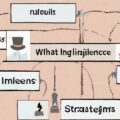Understanding Emotional Intelligence and Its Importance
Emotional intelligence (EQ) is the ability to recognize, understand, and manage our own emotions, as well as the emotions of others. It plays a crucial role in our personal and professional lives, influencing our relationships, decision-making, and overall well-being. By developing our EQ, we can enhance our self-awareness, empathy, and social skills, leading to more fulfilling and compassionate interactions with those around us.
Top EQ Exercises to Boost Self-Awareness
Self-awareness is the foundation of emotional intelligence. Here are some exercises to help you better understand your emotions and reactions:
- Emotion Journaling: Take a few minutes each day to write down your feelings and reflect on their causes.
- Body Scan Meditation: Practice mindfulness by focusing on different parts of your body and noticing any physical sensations or emotions.
- Trigger Identification: Keep a log of situations that provoke strong emotional responses to identify patterns and triggers.
- Values Clarification: Reflect on your core values and how they align with your daily actions and decisions.
- Feedback Analysis: Regularly seek feedback from trusted friends or colleagues and reflect on their insights.
Empathy-Building Activities for Better Relationships
Empathy is the ability to understand and share the feelings of others. These activities can help cultivate empathy:
- Active Listening Practice: Focus on truly hearing and understanding others without interrupting or judging.
- Perspective-Taking Exercises: Imagine situations from different viewpoints to broaden your understanding.
- Volunteering: Engage in community service to connect with diverse groups of people and their experiences.
- Empathy Map: Create visual representations of others’ thoughts, feelings, and motivations.
- Fictional Character Analysis: Analyze characters in books or movies to practice understanding complex emotions and motivations.
Emotional Regulation Techniques for Inner Peace
Managing our emotions effectively is key to maintaining inner peace and resilience. Try these techniques:
- Mindfulness Meditation: Practice being present in the moment without judgment.
- Deep Breathing Exercises: Use controlled breathing to calm your nervous system and reduce stress.
- Cognitive Reframing: Challenge negative thought patterns and reframe situations in a more positive light.
- Emotional Labeling: Identify and name your emotions to gain a sense of control and understanding.
- Progressive Muscle Relaxation: Systematically tense and relax muscle groups to release physical and emotional tension.
Social Skills Enhancement for Stronger Connections
Improving social skills can lead to more meaningful and compassionate relationships. Consider these activities:
- Role-Playing Scenarios: Practice different social situations to build confidence and communication skills.
- Nonverbal Communication Games: Enhance your ability to read and use body language effectively.
- Gratitude Expression: Regularly express appreciation to others to foster positive connections.
- Conflict Resolution Workshops: Learn techniques for addressing disagreements constructively.
- Social Networking Analysis: Reflect on your relationships and identify areas for growth and nurturing.
EQ Tests and Assessments for Personal Growth
While emotional intelligence is complex and multifaceted, various tests and assessments can provide insights into your EQ strengths and areas for improvement:
- Mayer-Salovey-Caruso Emotional Intelligence Test (MSCEIT): A comprehensive assessment of EQ abilities.
- Emotional and Social Competency Inventory (ESCI): Evaluates EQ competencies in workplace contexts.
- Trait Emotional Intelligence Questionnaire (TEIQue): Assesses emotional self-perceptions and traits.
- Genos Emotional Intelligence Inventory: Focuses on measuring emotionally intelligent workplace behaviors.
- Six Seconds Emotional Intelligence Assessment (SEI): Provides actionable steps for EQ development.
Remember, these tests are tools for self-reflection and growth, not definitive measures of your worth or potential. Use them as starting points for your emotional intelligence journey, always approaching yourself with kindness and compassion.
FAQ: Emotional Intelligence Exercises and Activities
Q1: How often should I practice EQ exercises?
A1: Consistency is key when developing emotional intelligence. Aim to incorporate EQ exercises into your daily routine, even if it’s just for a few minutes. Regular practice allows for gradual improvement and integration of EQ skills into your daily life.
Q2: Can emotional intelligence be improved at any age?
A2: Absolutely! Emotional intelligence is a skill that can be developed throughout our lives. While early experiences shape our initial EQ, ongoing learning and practice can lead to significant improvements at any age.
Q3: How can I apply EQ exercises in my workplace?
A3: Start by practicing active listening with colleagues, expressing empathy in team interactions, and using emotional regulation techniques during stressful situations. You can also suggest EQ workshops or incorporate brief EQ exercises into team meetings.
Q4: Are there any risks associated with focusing too much on EQ?
A4: While developing EQ is generally beneficial, it’s important to maintain a balance. Overemphasis on emotions without considering other factors can lead to decision-making biases. Strive for a holistic approach that combines emotional intelligence with critical thinking and practical skills.
Q5: How can I measure my progress in developing emotional intelligence?
A5: Track your progress by keeping a journal of your experiences, seeking regular feedback from trusted individuals, and periodically retaking EQ assessments. Notice changes in your relationships, stress management, and overall well-being as indicators of your EQ development.
Developing emotional intelligence is a lifelong journey that can lead to more fulfilling relationships, improved well-being, and a deeper sense of compassion for ourselves and others. By incorporating these exercises, activities, and assessments into our lives, we can cultivate greater self-awareness, empathy, and emotional regulation skills. Remember to approach this journey with patience and self-compassion, celebrating small victories along the way. As we enhance our EQ, we not only improve our own lives but also contribute to creating a more emotionally intelligent and compassionate world around us.









